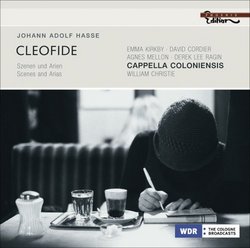| All Artists: Kirkby, Cappella Coloniensis, Mellon, Wong, Ragin, Visse, Cordier Title: Hasse: Cleofide Members Wishing: 0 Total Copies: 0 Label: Phoenix Edition Original Release Date: 1/1/2008 Re-Release Date: 1/27/2009 Genre: Classical Style: Opera & Classical Vocal Number of Discs: 1 SwapaCD Credits: 1 UPC: 811691011783 |
Search - Kirkby, Cappella Coloniensis, Mellon :: Hasse: Cleofide
CD Details |
CD ReviewsA voice teacher and early music fan George Peabody | Planet Earth | 05/04/2009 (5 out of 5 stars) "HIGHLIGHTS FROM A FOUR DISC OPERA PRODUCED IN 1986.
Johann Hasse (1699-1783) studied with Porpora in Naples. He was the first composer to set many of Metastasio's texts, and his music reflects the neo-classical ideal of Metastasio's style. A powerful dramatist, he was renowned for his careful use of the accompanied recitative (this is evident in 'Cleofide'. Hasses's long career covered the period around the middle of the eighteenth century, and his later works reveal attempts at overall unity by means of tonal planning and a reaction against the 'da capo' aria like those of Gluck. In 1734, he became composer for the court of Dresden, becoming one of the most powerful exponents of the Italian operatic style in Germany. 'Cleofide' was first performed in Dresden in September of 1731. Essentially, this work is based on the subject of jealousy, and has in general to do with conquest and the desire to be sole possessor of women and of kingdoms. This story idea is very reminiscent to me of the Gluck opera 'Iphigenie en Tauride'. In that opera the character 'Thoas' could be compared to Alexander in 'Cleofide', and in Purcell's 'Dido and Aeneas' we would have to equate Aeneas to that role, albeit unwittingly on his part. There are six main characters in this opera, all of whom perform their characterizations superbly: Emma Kirkby,soprano,Cleofide-Agnes Mellon, soprano,Erissena-Randall Wong, male sopranist,Gandarte-Derek Ragin,male alto,Poro-Dominque Visse,male alto,Alessandro-David Cordier,Timagene,male alto. One may think that with all these basically teble voices, that confusion would exist in the listening process, but the quality of each of them is so unique and so abviously different from one another it does not really present a problem. Those of you who have heard each or all or some of them will easily detect to whom you are listening. For example Visse's male alto voice is a bit rough and reedy whereas Cordier is somooth, rich and full. On the other hand, Ragin's voice is thin, but clear and clean sounding and he tends to sound more flexible. Wong, of course , is a male soprano and does not sound like Kirkby or Mellon who do not sound like each other. Enough said! It would have to be very difficult to take from four discs of excellent arias and pick the 'best', but I think this recording presents a fair picture of the singers and what they did in 'Cleofide' (still available in the marketplace if you are interested). Anyway since not much information is included as to who sang what, at much investment of my time, here they are: ACT ONE: Aria 'Che sorte crudele'(How cruel is the lot.)sung by Cleofide (Kirkby). Aria 'Ve drai con tuo periglio' (You'll see it at your peril.) sung by Poro (Ragin). Duetto 'Se mai piu saro geloso'(Should I ever be jealous again,)Cleo & Poro. ACT 2 Aria 'Appena amore sen nace'(As spun as Cupid is born)sung by Gandarte (Wong). Aria 'E ver che a l'amo intorno' (Circling the fishing hook) sung by Timagene (Cordier). Recitative 'Poro mio dolce amor'(Poro, my sweet love) sung by Cleo & Erissena(Mellon). Aria 'Se Costa tante pene amor a la belta'(If Cupid causes such pain)sung by Erissena. Aria 'Son qual misera colomba' (I am like the poor dove) sung by Cleo. ACT THREE: Aria 'Cervo al Bosco'(the stag in the wood) sung by Alessandro(Visse). Aria 'Dov'e? si affretti'(Where is he?) sung by Poro. Recitativo 'Secondate, O gran Numi'(Favor the magnaminous Gods) sung by Cleo. Aria 'Perder l'amato bene' (Loving one's beloved) sung by Cleo. CORO 'al nostro consolo'(Now that we are consoled. The COMPLETE opera is a listening experience of excitement and beauty, and although I must confess that Hasse's music has not been one of my listening favorites, this work is an exception. The advantage of the highlights is, of course, that you need not listen to all of the recitatives, but truthfully I haven't minded even doing that at all. This approach is a great way to give you some idea of the entire opera. " |

